Wade Surname Ancestry ResultsOur indexes 1000-1999 include entries for the spelling 'wade'. In the period you have requested, we have the following 1857 records (displaying 621 to 630): Single Surname Subscription | | | Buying all 1,857 results of this search individually would cost £10,646.00. But you can have free access to all 1,857 records for a year, to view, to save and print, for £100. Save £10,546.00. More... |
These sample scans are from the original record. You will get scans of the full pages or articles where the surname you searched for has been found. Your web browser may prevent the sample windows from opening; in this case please change your browser settings to allow pop-up windows from this site. Soldiers wounded: Yorkshire Light Infantry
(1916)
Lists of names of soldiers wounded, died of wounds, died, missing presumed dead, and taken prisoner by the enemy, were issued to the British national press under the title Roll of Honour. Each man is identified by surname, initials and number. The regimental returns from which the daily Roll was compiled were made up over the previous week or weeks. Each regimental return may be partial, covering only part of the alphabet. The lists are provisional, in that a man reported wounded one day may appear as died of wounds later; a missing presumed dead may later be reported as having been found, or as having died; the lists of prisoners of war were provided by the enemy and will relate to captures weeks earlier. However, these rolls are the most comprehensive single source of names of British and allied combatants meeting with misfortune in the Great War. This is the roll published 3 August 1916. WADE. Cost: £6.00.  | Sample scan, click to enlarge
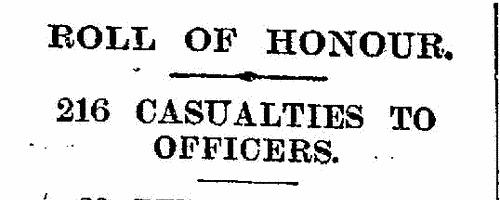
| Freemen and citizens of London
(1291-1309)
Letter Book C of the City of London contains enrolments of recognizances between inhabitants, particularly citizens, for sums of money lent or due; grants of pieces of land or property; and various records relating to the city administration, minor infractions, &c. The text was edited by Reginald R. Sharpe and printed by order of the Corporation of the City of London in 1901.WADE. Cost: £4.00.  | Sample scan, click to enlarge

| Officers at the Battle of Almanza
(1707)
25 April 1707 at Almanza in southeast Spain a decisive battle was fought in the war of the Spanish succession; the French (under the Duke of Berwick) shattered an Anglo-Spanish army (under the Earl of Galway) advancing on Madrid. In January 1711 the House of Lords held an inquiry into the debacle, and among the papers produced was this 'List of the Names of the General Officers and other Commission Officers that were at the Battle of Almanza'. Arranged by regiment, it gives full names of captains, lieutenants, cornets, quartermasters, chaplains, surgeons and adjutants. In almost every case the lists are annotated as to whether each officer was actually present at the battle (most were), and whether killed in the conflict. The list was edited by Maurice F. Bond, clerk of the records to the House, and published in 1949.WADE. Cost: £4.00.  | Sample scan, click to enlarge

| House of Lords Proceedings
(1710-1712)
Acts, appeal cases, bills, commissions, estate acts and bills, and writs of summons. This abstract of the archives from 21 March 1710 (New Style) to 16 June 1712, was prepared by Maurice F. Bond and printed in 1949 in continuation of the volumes issued under the authority of the Historical Manuscripts Commission. The proceedings are cross-referenced to the printed Lords Journal (L. J.). In this period there were several important estate acts, dealing with disputed and/or entailed landed estates, which by their nature give some detail about the families involved.WADE. Cost: £4.00.  | Sample scan, click to enlarge
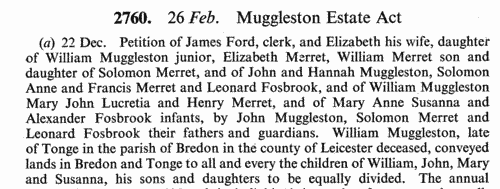
| Landowners and tenants in Derbyshire
(1345-1485)
Inquisitions ad quod damnum were held by the appropriate sheriff or escheator (or other officer in whose bailiwick the matter in question might lie) to investigate cases in which the royal or public interest might be damaged by proposed alienation or settlement of land (especially alienation to religious uses, into mortmain). The key findings from these inquisitions were as to the tenure of the land and the service due from it; its yearly value; the lands remaining to the grantor, and whether they sufficed to discharge all duties and customs due from him; and whether he can still be put upon juries, assizes and recognitions, so that the country be not burdened by his withdrawal from them. Generally speaking, this process had the makings of a system of licensing such alienations, and raising money in proportion to the valuations. Equally, there are many items that deal with subjects such as the closing of public roads, the felling or inclosing of woods, or the proposed grant of liberties or immunities. A calendar of these inquisitions from the 19th year of the reign of king Edward III to the 2nd year of Richard III was prepared by the Public Record Office and published in 1906. We have now indexed this calendar by surname and county. Most of the individuals appearing in the calendar are either pious individuals seeking to make grants to religious bodies for the sake of their souls; or landowners securing the disposition and settling of their real estate. But some other names do appear - tenants, trustees, chaplains and clerks.WADE. Cost: £6.00.  | Sample scan, click to enlarge
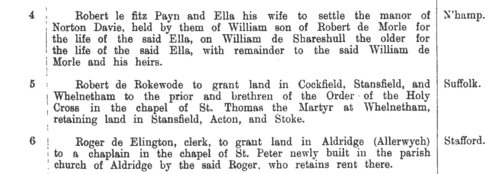
| Landowners and tenants in Leicestershire
(1345-1485)
Inquisitions ad quod damnum were held by the appropriate sheriff or escheator (or other officer in whose bailiwick the matter in question might lie) to investigate cases in which the royal or public interest might be damaged by proposed alienation or settlement of land (especially alienation to religious uses, into mortmain). The key findings from these inquisitions were as to the tenure of the land and the service due from it; its yearly value; the lands remaining to the grantor, and whether they sufficed to discharge all duties and customs due from him; and whether he can still be put upon juries, assizes and recognitions, so that the country be not burdened by his withdrawal from them. Generally speaking, this process had the makings of a system of licensing such alienations, and raising money in proportion to the valuations. Equally, there are many items that deal with subjects such as the closing of public roads, the felling or inclosing of woods, or the proposed grant of liberties or immunities. A calendar of these inquisitions from the 19th year of the reign of king Edward III to the 2nd year of Richard III was prepared by the Public Record Office and published in 1906. We have now indexed this calendar by surname and county. Most of the individuals appearing in the calendar are either pious individuals seeking to make grants to religious bodies for the sake of their souls; or landowners securing the disposition and settling of their real estate. But some other names do appear - tenants, trustees, chaplains and clerks.WADE. Cost: £6.00.  | Sample scan, click to enlarge
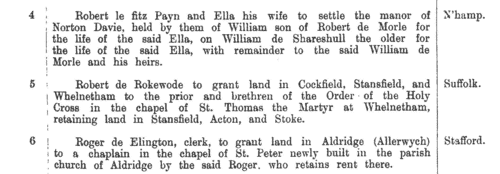
| Landowners and tenants in London
(1345-1485)
Inquisitions ad quod damnum were held by the appropriate sheriff or escheator (or other officer in whose bailiwick the matter in question might lie) to investigate cases in which the royal or public interest might be damaged by proposed alienation or settlement of land (especially alienation to religious uses, into mortmain). The key findings from these inquisitions were as to the tenure of the land and the service due from it; its yearly value; the lands remaining to the grantor, and whether they sufficed to discharge all duties and customs due from him; and whether he can still be put upon juries, assizes and recognitions, so that the country be not burdened by his withdrawal from them. Generally speaking, this process had the makings of a system of licensing such alienations, and raising money in proportion to the valuations. Equally, there are many items that deal with subjects such as the closing of public roads, the felling or inclosing of woods, or the proposed grant of liberties or immunities. A calendar of these inquisitions from the 19th year of the reign of king Edward III to the 2nd year of Richard III was prepared by the Public Record Office and published in 1906. We have now indexed this calendar by surname and county. Most of the individuals appearing in the calendar are either pious individuals seeking to make grants to religious bodies for the sake of their souls; or landowners securing the disposition and settling of their real estate. But some other names do appear - tenants, trustees, chaplains and clerks.WADE. Cost: £6.00.  | Sample scan, click to enlarge
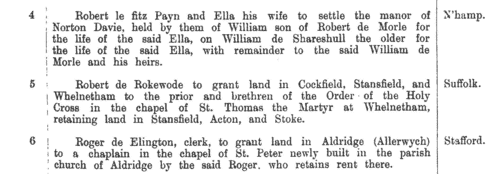
| Landowners and tenants in Rutland
(1345-1485)
Inquisitions ad quod damnum were held by the appropriate sheriff or escheator (or other officer in whose bailiwick the matter in question might lie) to investigate cases in which the royal or public interest might be damaged by proposed alienation or settlement of land (especially alienation to religious uses, into mortmain). The key findings from these inquisitions were as to the tenure of the land and the service due from it; its yearly value; the lands remaining to the grantor, and whether they sufficed to discharge all duties and customs due from him; and whether he can still be put upon juries, assizes and recognitions, so that the country be not burdened by his withdrawal from them. Generally speaking, this process had the makings of a system of licensing such alienations, and raising money in proportion to the valuations. Equally, there are many items that deal with subjects such as the closing of public roads, the felling or inclosing of woods, or the proposed grant of liberties or immunities. A calendar of these inquisitions from the 19th year of the reign of king Edward III to the 2nd year of Richard III was prepared by the Public Record Office and published in 1906. We have now indexed this calendar by surname and county. Most of the individuals appearing in the calendar are either pious individuals seeking to make grants to religious bodies for the sake of their souls; or landowners securing the disposition and settling of their real estate. But some other names do appear - tenants, trustees, chaplains and clerks.WADE. Cost: £6.00.  | Sample scan, click to enlarge
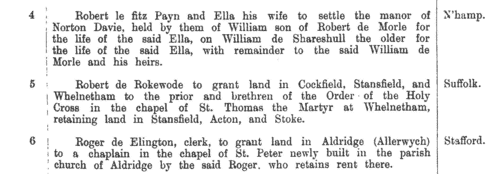
| Army Officers
(1741)
'A General List, or Catalogue, Of all the Offices and Officers Employ'd In the several Branches of his Majesty's Government Ecclesiastical, Civil, Military, &c. In South-Britain, or England' gives the names (and often the annual salaries) of the government functionaries, civil servants, churchmen and military, systematically arranged section by section. Section 32 lists all the colonels, lieutenant-colonels and majors in his Majesty's troops of guards, grenadier guards, regiments of horse, dragoons and foot in Great Britain, followed by a list of all the colonels, lieutenant-colonels and majors in his Majesty's forces in Ireland, Minorca, Gibraltar, and in the Plantations (Leeward Islands, Placentia and Canso, Georgia, Jamaica, New York, Bermudas, and Providence).WADE. Cost: £6.00.  | Sample scan, click to enlarge
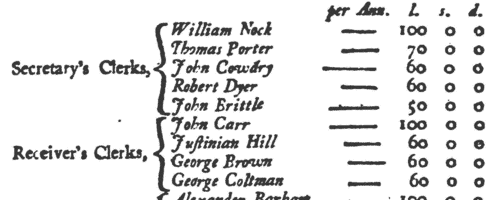
| Army Officers: General Staff
(1741)
'A General List, or Catalogue, Of all the Offices and Officers Employ'd In the several Branches of his Majesty's Government Ecclesiastical, Civil, Military, &c. In South-Britain, or England' gives the names (and often the annual salaries) of the government functionaries, civil servants, churchmen and military, systematically arranged section by section. Section 31 lists all the general officers, with their dates of commission, down to brigadier-generals.WADE. Cost: £6.00.  | Sample scan, click to enlarge
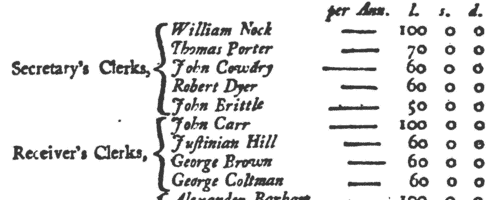
|
Research your ancestry, family history, genealogy and one-name study by direct access to original records and archives indexed by surname.
|












